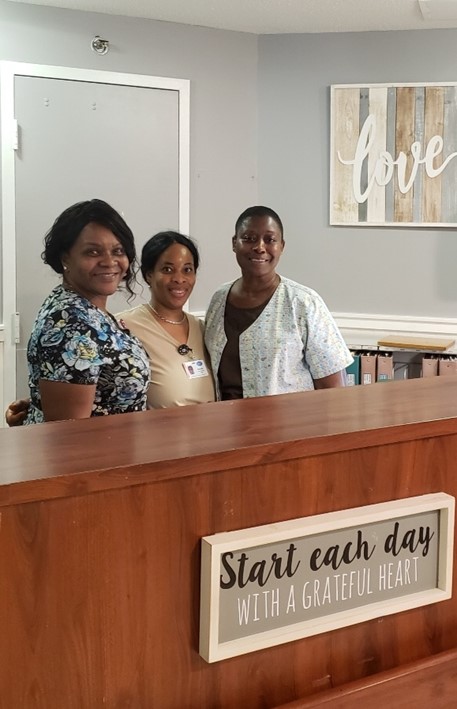New Beginnings - iRecovery Unit
The iRecovery program is designed for those individuals who need skilled nursing or post-acute care coupled with substance use counseling and supports provided by a counseling partner service.
iRecovery was developed to meet the needs of the residents iCare and Chelsea Place were already serving but in a more holistic, dynamic and therapeutic way. It was designed to utilize clinical proficiency and a variety of external and third party partnerships to treat active addiction and teach sober recovery skills with the goal of long-term sobriety and recovery.
What is iRecovery?
iRecovery utilizes a groundbreaking approach, in which sub acute medical and psychosocial needs are met. The program includes intensive group and individual therapy, administered by contracted Recovery Specialists. Also, in collaboration with various local groups, our Program offers community support and assistance with re-integration upon discharge.

Chelsea Place’s iRecovery program is housed within the 30 bed New Beginnings Unit. Through a cooperative approach, residents are asked to make a commitment to their recovery prior to admission. The multi-disciplinary team, including iCare clinical staff and the third party counseling partner, oversee daily psycho-social rehabilitative groups, person-centered care planning and assistance with discharge planning.
- The combination of iRecovery and the third party counseling services IS a partial-hospital, intensive outpatient model program designed to take place while a patient receives medically necessary skilled nursing and/or therapeutic rehabilitation in a skilled nursing center setting.
- IT IS NOT an inpatient detoxification or drug and alcohol rehab center for managing withdrawal symptoms, but rather a skilled nursing care center with the capacity, partnerships and skills to deliver integrated substance use disorder recovery services as well.
iRecovery Program - Frequently Asked Questions Brochure
Additional Therapeutic and Supportive Services
-
Peer Groups run by the Recovery Unit Council
- Family Nights once per week

- Monthly meeting with Connecticut Community for Addiction Recovery (CCAR)
- Weekly pastoral services
- Therapeutic recreation such as Reiki, Chair Yoga, Aromatherapy, Zumba and Open Gym
- Specialized dietary services based on peer council requests
The iRecovery Mission
The mission of iRecovery is to successfully treat Substance Use Disorders, thereby ending the cycle of hospitalization, discharge, relapse, decompensation, and re-hospitalization.
It is our mission to engage these patients in our multi-modality Recovery Program, so that by the time they are medically ready for discharge we have stabilized their addiction.
Upon leaving our Program, clients would be equipped with the knowledge, experience and community support systems to continue the iRecovery process. This lessens the likelihood of relapse or re-hospitalization.
We ask prospective participants in our Program to be open to the idea of a life of abstinence from alcohol and the illicit use of chemicals. We make this request while being fully aware of the ambiguous feeling towards such a lifestyle change that is inherent with those who suffer from Substance Use Disorders.
Link: iRecovery Celebrates Third Anniversary - Over 600 Patients Served…
Link: Dr. Craig Allen Joins iCare Health Network as Medical Consultant for Substance Use Disorders…
Group Program Specifics
Group therapy is the modality of choice when treating Substance Use Disorders. Two distinct models are used by our partners: Psycho-Educational groups and Process groups, both led by specially trained partner clinicians such as Licensed Practical Counselors, Licensed Drug and Alcohol Counselors, Licensed Clinical Social Workers and others.
The Psycho-Educational groups meet once weekly and here patients gain in-depth insight into their disease and the best treatment pathways available. The Process groups meet twice weekly and are based on the Mutual Aid Model. The Mutual Aid Model is an alliance of individuals working on common problems and goals to create helping relationships. These sessions are a vital ingredient to the recovery process. Fin ally, the private sessions are used to augment the work done in the group model.
ally, the private sessions are used to augment the work done in the group model.
Medication Assisted Therapy
iRecovery welcomes patients who are part of a Methadone, Suboxone, Sublocade or Vivitrol maintenance program. We view medication assisted therapy as a very effective tool in achieving sobriety. iRecovery facilities have established relationships with the major methadone clinics in Connecticut and use innovative techniques and delivery methods to best serve our residents and their needs.
Discharge Planning
The iRecovery discharge plan helps the patient towards a relapse-free experience. Together, the iRecovery Specialist and the resident will develop an aftercare program that includes outpatient counseling and finding a sponsor in a recovery group near to the patient’s discharge location. Discharge instructions will be provided to include a calendar of meetings, educational materials, and other local community supports. Periodic post-discharge follow-up phone calls are made to the clients to ascertain their new experience.
Community Reintegration Activities
- Reintegration groups led by the iRecovery Unit Manager four times per week plus family nights.

- Psycho-social groups discuss coping skills, problem solving, community programs, healthy behaviors and more…
- Goals of maintained sobriety, connecting with community resources such as primary and mental health and substance abuse treatment through recovery, transitional, and halfway houses.
Special Considerations
The iRecovery Program supports a patient population with a unique and sometimes complex set of challenges. With relapse and patient safety in mind, we have developed protocols that address the following areas:
- Admission Adjustment/Integration
- Visitation
- Medication Management
- Environmental Safety
- Community Reintegration/Discharge
-
Behavioral Health Program - Secured Unit
The Lighthouse Unit
-
Skilled Nursing and Sub-Acute Services
Comprehensive skilled care from seasoned nurses
-
Greater Hartford Memory Care Center
Enhancing and Protecting Dignity and Preserving Quality of Life
-
Touchpoints Therapy - Rehabilitation Services
Physical - Occupational - Speech Therapy
-
Social Services Supports and Discharge Planning
Addressing Individual Resident Needs
-
Dietary and Dining Services
-
Care Plan Coordinators
Comprehensive and Person-Centered
-
Recreation Programs


